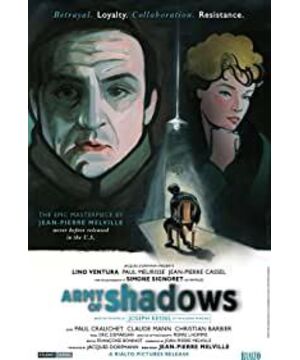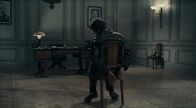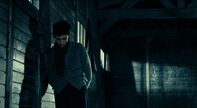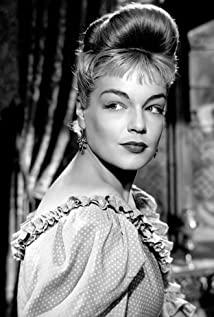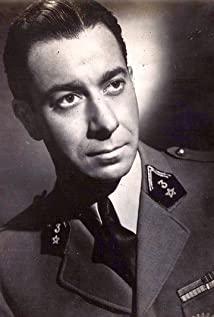June 14, 1940, was the darkest day in French history.
The German Nazis drove straight into Paris. Such a momentous moment in history, when it came to the movie "Shadow Army" , was explained with only three elements.
The exterior scene of the Arc de Triomphe, the Nazi military music, and the German troops opened the curtain of the dark age of France.
The seemingly simple opening scene was once the most expensive shot in the history of French cinema. As the director recalled:
"It cost 25 million old francs. I was initially given permission to rehearse the scene on the Rue de Iena. At 3am, the whole street was traffic-controlled, lit entirely by gas lights, and people in military uniforms started lining up the street. ."
After "Second Breath" and "Lone Killer", two masterpieces with a gangster character, director Jean-Pierre Melville brought 1969's "Shadow Army" .
He continues his minimalism. In his films, there is almost nothing fancy and superfluous, scene props, actor movements, camera cuts, all clean and straight to the point.
Because of this, the cruelty of war is exposed under his lens.
"Shadow Army" can be said to be a main theme film praising the French indigenous resistance organization in World War II. It is adapted from the novel of the same name by Joseph Kessel, but the way of praising is a bit special, without heroism, no tearjerking sensation, no passion and blood. , only naked and real.
The story begins two years after Paris was occupied.
On October 20, 1942, World War II had reached a turning point. After the establishment of the World Anti-Fascist Alliance, the United States won the Battle of Midway, the United Kingdom hit the German-Italian coalition in the North African battlefield, and the main German troops stormed the Soviet Union Stalinger. Le encountered strong resistance, and the balance of victory has begun to tilt in favor of the Allies.
Inside France, however, the Nazis remained firmly in control. The Vichy puppet government arrested all kinds of people suspected of disobedience and imprisoned them in concentration camps. A middle-aged man named Philippe Gerbier was also taken to a concentration camp for allegedly supporting "Free France" leader Charles de Gaulle.
He was a high-ranking official in the civil engineering department, quick-witted, withdrawn and indifferent, and sharp-spoken. Through the narration of the interrogation report, the hero of the story is introduced briefly and clearly.
The film took about 20 minutes to show Gerbier's life in the concentration camp. If it were replaced by a commercial film today, it might be finished in 5 to 10 minutes. Why did Melville take so long?
Because the master movies at that time were not impetuous, the overall rhythm of "Shadow Army" was so slow, you need to calm down before watching the movie, in order to follow Melville's footsteps, as if you were going back to World War II.
From Gerbier's performance in the concentration camp, it can be seen that he was calm and calm when he was in trouble. He also called the people in the camps fools and mentally retarded, and he despised the "keyboard warriors" who did nothing, revealing his desire to contribute to the country.
Although not as cool and handsome as Alain Delon, Gerbier's hero image has been methodically established.
The audience began to believe that he had the ability to escape from prison. As one of the leaders of the French resistance organization, this "small thing" could not be done. What about the great cause of recovering France.
With Gerbier's perspective, more members of the resistance group appeared one by one.
Felix Lepercq, an old friend of Gerbier, is reliable in his work. At first glance, he is a veteran cadre for many years.
Jean François Jardie, who looks a bit like "Uncle Wolf", is an old friend of Felix and joins the resistance after being invited.
Luc Jardie, he went to London, England to be awarded by Charles de Gaulle, which shows that he has made a lot of contributions. The scene of the award is from the real experience of French resistance leader Jean Morin, who is the prototype of Luc Jardie's character.
Mathilde, arguably the most eye-catching character in the entire film, was simply a "feminist spokesperson" 50 years ago. She is born with organizational leadership ability and obedience to orders, strong-willed, patient, courageous and resourceful, and is a typical female hero image.
Under the gloomy and dark tone, several members of the resistance organization secretly carried out high-pressure and high-intensity work like shadows. Their enemies are not only the Nazis and the Vichy government, but also the defected "two or five boys". Gerbier is arrested at the very beginning, because of a betrayer's whistleblower.
For those who leak information, the resistance organization has an iron law, killing without amnesty.
35 minutes into the film, the first strong conflict comes. The resistance group caught a stupefied young man who betrayed the organization. According to regulations, this young man in his 20s must die, whether with a gun, a knife, or a rope.
There is disagreement within the organization, and some people think that killing a young man in this way is tantamount to murder. The audience must be particularly disturbed when they see this. The lad did do something wrong, but it doesn't kill him, right?
No, in wartime, that was a capital offense.
Several violent conflicts that followed were somewhat similar, and Gerbier needed an exceptionally firm will to make a cruel and ruthless decision.
kill the betrayed youth;
kill captured comrades;
Kill the hero who was forced to confess.
The whole film does not show what contribution the "Shadow Army" made in World War II, how many Nazis were killed, and their actions are more about fighting against human nature.
They look like machines, but in fact they all have a human side, with the male and female characters being the most detailed.
After being arrested for paying taxes, Gerbier had already accepted the fate of death. Unexpectedly, under the coercion of the Germans, he still did the last thing he did not want to do, like a frightened rabbit, humiliated and ran away with his life.
It is human instinct to escape from death, and people with strong moral sense are no exception.
The shrewd and capable Mathilde has a happy family. She has to do her job as a mother without sacrificing the mission of the organization. Since ancient times, there has been a "dilemma of loyalty and righteousness". If she can't let go of her family, no matter how good she is, it will be difficult for her to be perfect in the revolutionary cause.
The fact is that she can't let go of her family at all, and the picture of her daughter is the best proof.
After adding the humanized setting, the audience can more easily appreciate the difficulties of members of the French resistance.
In fact, they are also ordinary people, and they can be like some "walls of grass", succumbing to the German rule, letting go of their dignity, but they can live a better life.
But another human "instinct" stopped them, and their souls cried out.
"Painful memory! But I still welcome you, because you are my long-lost youth."
The sentence written in the opening subtitles is full of blood. If there is no youthful blood, what is the meaning of human life? Do you eat, drink and sleep like beasts?
Even if "youth" is painful, people still can't help but miss the past.
Members of the Shadow Force are in pain as they secretly rebel against German taxes. On the one hand, they have human nature, and on the other hand, in order to complete the task, they have to perform dehumanizing behaviors.
What's more cruel is that until the end of the movie, the protagonists paid the price with their lives, and they did not directly exchange for even a victory. They are not as famous as de Gaulle, Churchill, Roosevelt, and many people may have died in vain in various ways without contributing.
Of course the French resistance played a role in World War II, but it was not the decisive factor. Many more are spontaneously participating in the resistance, not knowing what role they can play in this war.
Most likely, after death, there is no name at all.
Yet tens of thousands of people went anyway.
Some of them collect intelligence, some participate in guerrillas, and with their meager strength, they swipe fist after fist at evil.
Their sacrifice, perhaps really insignificant, is a beautiful manifestation of the human spirit.
They deserve to be remembered and brought up again and again over the years.
Jean-Pierre Melville used a film to remind people that some heroes, some things, some spirits, should not be forgotten.
"Shadow Army" was released on September 12, 1969, and it is 2019, which is exactly its 50th anniversary. At least 50 years later, this classic has not been forgotten.
You're in the butcher's car, and there's nothing scary in the world anymore.
- "Shadow Army"
View more about Army of Shadows reviews


